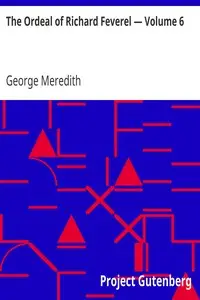"Evan Harrington — Volume 7" by George Meredith is a story fixed on a young tailor attempting to find his way through the complex social rules of the Victorian era. The book focuses on concepts like who we are, how society views us, and the challenges of love, as the main character deals with judgment based on his job. The story begins at Mr. Goren's tailor shop which gives our main chracter shelter from the world, where the main character thinks back on his past heartbreak, and shares the troubles he is burdened with alongside Mr. Goren. The story emphasizes the main character's feelings of not being good enough because of his occupation. As the story picks up a carriage arrives and interrupts all the characters. This event introduces a woman with urgent news for the main character, promising intertwined relationships and drama throughout the story.

Evan Harrington — Volume 7
By George Meredith
In a world defined by social class, a tailor's hidden past is revealed when a mysterious carriage and a woman with shocking news arrive.
Summary
About the AuthorGeorge Meredith was an English novelist and poet of the Victorian era. At first, his focus was poetry, influenced by John Keats among others, but Meredith gradually established a reputation as a novelist. The Ordeal of Richard Feverel (1859) briefly scandalised Victorian literary circles. Of his later novels, the most enduring is The Egoist (1879), though in his lifetime his greatest success was Diana of the Crossways (1885). His novels were innovative in their attention to characters' psychology, and also portrayed social change. His style, in both poetry and prose, was noted for its syntactic complexity; Oscar Wilde likened it to "chaos illumined by brilliant flashes of lightning". Meredith was an encourager of other novelists, as well as an influence on them; among those to benefit were Robert Louis Stevenson and George Gissing. Meredith was nominated for the Nobel Prize in Literature seven times.
George Meredith was an English novelist and poet of the Victorian era. At first, his focus was poetry, influenced by John Keats among others, but Meredith gradually established a reputation as a novelist. The Ordeal of Richard Feverel (1859) briefly scandalised Victorian literary circles. Of his later novels, the most enduring is The Egoist (1879), though in his lifetime his greatest success was Diana of the Crossways (1885). His novels were innovative in their attention to characters' psychology, and also portrayed social change. His style, in both poetry and prose, was noted for its syntactic complexity; Oscar Wilde likened it to "chaos illumined by brilliant flashes of lightning". Meredith was an encourager of other novelists, as well as an influence on them; among those to benefit were Robert Louis Stevenson and George Gissing. Meredith was nominated for the Nobel Prize in Literature seven times.












